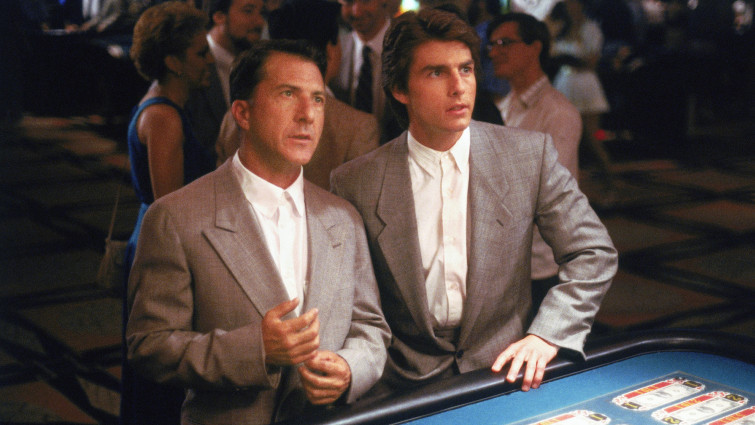

Member review

Rain Man
Charlie Babbitt gets more than he bargained for when he kidnaps his autistic brother for his inheritance in an entertaining, touching drama.
Certificate
Duration127 mins
Review by
-
 Samuel, 17
Samuel, 17 - 6 reviews
Rain Man Review by Sam Wright.
Rain man is one of the most acclaimed films of the 80s and the winner of a score of Oscar awards. It was also a film with a lot of cultural significance and ended being one of the most iconic portrayals of mental disability in cinema. The acting from Dustin Hoffman and Tom Cruise has rightly drawn plaudits, yet some people have criticised the portrayal of autism in the film as superficial and failing to portray some of the finer complexities of the condition. The choice to make Raymond an autistic savant is seen by some as perhaps a contrived plot-device, as it is only through discovering Raymond's abilities that Charlie learns to respect him, and obviously there are many people in the world who suffer a lot of the limitations that Raymond does but don't have any of his abilities.
The lesson of the film here, although it ends up getting lost in Charlie's character arc, is the need for special treatment for people with disabilities such as the one portrayed by Dustin Hoffman in this film. The film gives a good representation of what autistic people went through before special education and treatment programs were standardised. Raymond’s parents obviously had a strong disregard for him, treating him like a monster when he got himself into an accident with Charlie when they were young, and this in turn led him to be sent away into the mental institution. This not only traumatised Raymond but also impacted Charlie very heavily, as he loved his brother so much and this experience of loss would plant the seeds that would lead him to abandon his father and transfer his loving memories for Raymond to this imaginary ‘rain man’ character. The difficulties that Raymond goes onto face when on the road with Charlie also serve to highlight the need for him to be placed under close care.
The film however suffers from a slightly confused moral compass. It presents the idea that it is acceptable for Charlie to exploit his brother at a casino in order to make money and yet in the beginning it presented the idea that it was unacceptable for Charlie to exploit his brother to receive his ‘deserved’ inheritance. At the end of the film, it feels as if it's trying to force us to feel sympathetic to Charlie, despite it being clear that what's best for Raymond and that which supports the film's main message is for him to be placed back in care.
Ultimately, this is a film that struck a chord with a lot of people, and still continues to do so through the themes that it presents and the quality acting that portrays them. It isn't a film without flaws however: the somewhat average score and for a film that so grounded in character development and sentiment, it does sometimes feel like it's unsure as to what exactly it's trying to communicate. However, the significance of this film in popular culture can't be denied and thus I feel inclined to score it with a strong 4/5.